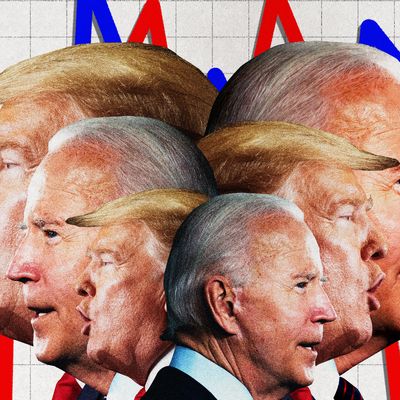
As we get closer to closing the books on this stupendously important and yet unsatisfactorily conclusive election, there will be much speculation about the origins and extent of the gap between blue expectations and a red undertone in the actual results. That there is a gap is hard to dispute, though it could decline a bit as late votes trickle in. At present, Joe Biden’s lead in the national popular vote is 3 percent; he led in the final polling averages at FiveThirtyEight by 8.4 percent and at RealClearPolitics by 7.2 percent. State polls of the presidential contest seem to have been pretty accurate in some cases (e.g., Georgia and North Carolina) and significantly off in others (e.g., Wisconsin and Michigan). The latest tabulation of the House national popular vote shows Democrats leading by one percent; Democrats led in the generic congressional ballot (as estimation of the House national popular vote) by 7.3 percent at FiveThirtyEight and 6.8 percent at RCP.
There’s no equivalent national measurement of Senate races, but polling averages underestimated the Republican vote in nearly all of them. Comparing the current vote totals to the RCP averages shows a pro-Democratic miss of 5.2 percent in Iowa; 4.4 percent in North Carolina; 3.7 percent in Michigan; 3.2 percent in Arizona; and 2.5 percent in Georgia. In races without enough data for polling averages, there was still plenty of evidence of GOP overperformance. Nearly all the public polls taken of the Maine Senate race throughout the year showed Sara Gideon leading Susan Collins — yet Collins is winning by 7.9 percent with 88 percent of the vote in. Similarly, Republicans thought to be in close races in Kansas, Montana, and South Carolina blew out to double-digit wins.
Yes, recent precedents suggest Democratic vote totals will likely improve when all the votes are in, and the Donkey Party still has a shot at Senate control if it can win two January runoffs in Georgia. But it is increasingly clear that the “blue shift” we all expected in late results may not be as large as originally expected (especially in California, the very blue state with millions of votes still out), in part because Democrats tried very hard to cast mail ballots as early as they could.
So what happened? Was there a late shift of support to Republican candidates, or just systemic polling error? Or both?
It’s going to be a while before we can make a very informed judgment on that question. We would normally turn to exit polls for evidence about late deciders. But this year’s exits are suspect for multiple reasons, not least of which is the reliance on preelection surveys to capture the views of those casting mail ballots. Once researchers finish adjusting exit-poll data to reflect actual votes, they will be more reliable (though not as reliable as the voter-file and census data we will get far down the road). At present, they show a relatively small number of voters deciding late, but the latest deciders tilting toward Trump: the 3 percent who say they decided “in the last few days” going for POTUS 50-45, while the 2 percent who say they decided “in the last week” preferring Trump 63-30.
As for polling error, Nate Silver calculates that the average level of error in national polling of presidential contests is about 3 percent. It looks like it will be higher this year and, for the second time in a row, missing in the same blue direction. If polling really is showing systemic (not random) error, there will be fresh scrutiny of issues like the undercounting of non-college-educated white voters that definitely occurred in 2016. But we should remain open to the possibility that, for all of Trump’s clumsiness and evil rhetoric down the homestretch of this contest, his campaign got some things right, and so did those of his fellow Republicans.






























